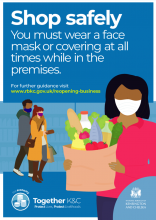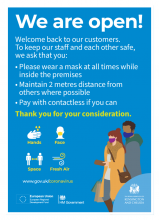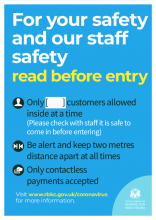COVID-19: Guidance for operating your business
Guidance for operating your business
From Thursday 27 January 2022, ‘Plan B’ restrictions, initially introduced on 8 December 2021 to combat the rapid spread of the new Covid-19 variant Omicron, will be removed. This means that:
- Face coverings are no longer mandatory in any indoor settings, though they are still recommended to be worn in crowded or enclosed spaces
- Venues will no longer be legally required to enforce use of the NHS COVID Pass, though they can still be used on a voluntary basis
- People are no longer advised to work from home, though employers can still use their discretion for flexible working
With the removal of Plan B, this means the country is free from restrictions around Covid-19. This is partly due to the success of the vaccination and booster programme. To ensure the safety of your staff and customers, you should also encourage regular Covid-19 testing.
Visit the Government website for the full guidance on the restrictions.
For everything you need to know about financial help available, please visit Covid-19 support for businesses and the self-employed.
Print and display in your premises
Hospitality business helpline
If you have a specific Covid-19 related query and can’t find the information you need on our website, we have set up a dedicated hospitality business helpline to offer further support.
Call 020 7361 2161, Monday to Friday 9am – 5pm and you’ll be connected to the right service to answer your query. We are here to support you and our local economy.
This line is purely for matters directly related to Covid-19. For standard service queries, you can find direct contact information on the relevant services webpages.
Kensington and Chelsea’s Covid-19 Guidance and Measures 2020/21
The Council will continue to support the recovery of businesses and their operation in line with Covid-19 regulations. You can find below some of our key measures and guidance for businesses as part of our key principles:
- We will work to allow more use of outdoor space for businesses, managing space for pedestrians, and making application processes as easy as possible. Our approach to licensing has been adapted and we are willing to innovate.
- We want to ensure that pedestrians can use pavements safely, in a way that complies with social distancing requirements.
- Our Street Ambassadors will support these aims.
- As advice and circumstances change, we will take an agile approach.
- We will implement temporary, low cost and reversible highways interventions and respond, learn and adapt.
- Tables and chairs licensing
-
Applying for a Pavement Licence
A Pavement Licence is a new, temporary licence that allows businesses to place tables and chairs and other street furniture on pavements and closed roads so that pedestrians can walk safely without being obstructed. Covid-19 restrictions mean groups of up to 6 people from different households can meet outdoors so this licence can help you to bolster your outside dining and drinking provision to accommodate customers.
The Pavement Licence costs £100 and has recently been extended for another 12 months from until 30 September 2021. For more information and how to apply visit the Apply for a pavement licence page.
Increasing the footprint
Some premises may want to place their tables and chairs further out onto the kerb or extend laterally in front of their premises and possibly adjacent to their premises, which you can do with the consent of the adjoining owner. In such cases, Street Ambassadors will work with you to ensure that they are not causing a dangerous obstruction. This is likely to mean that there should be 2.5m clear footway width for pedestrians to use, or as much as 3.5m on our busiest shopping streets. We need to avoid excessive encroachment onto the pavement, where walking on our streets becomes difficult, and the streets become unattractive to use.
Converting parking bays to tables and chairs areas
Where premises have parking bays in front of them, and where traffic volumes aren’t high, we can consider suspending parking bays for use by cafes. Most premises are about one parking bay wide – some are bigger. We would consider granting up to two adjacent parking spaces if there is sufficient room, unless the adjacent premises also wishes to place tables and chairs in one of those spaces.
- Supply of alcohol for customers who are in an outside area
-
We’re doing all we can to make our processes as simple and quick as possible within the parameters of the Licensing Act legislation. You can apply online to vary your existing licence or request a new one. Visit our Licensing pages for more information.
Business and Planning Act 2020 – Off-Sales In Licensed Premises
The Business and Planning Act 2020 temporarily modified the existing Licensing Act 2003 to allow premises already licensed for on-sales of alcohol prior to 22 July 2020 to also provide off-sales of alcohol to 11pm or to the current time of their existing on-sales, if earlier.
The modifications will be in place until 30 September 2021.
If you are planning to take advantage of the new off-sales provision for your business, you’ll need to:
- notify the Council as your licensing authority by email via [email protected];
- if you are licensed for on-sales of alcohol only, prepare a ‘Section 172F’ statement
- if you are licensed for on- and off-sales of alcohol and are relying on the provisions of section 172F(5) to temporarily suspend any conditions relating to off-sales during the relevant period, prepare a ‘Section 172F(5)’ statement
- prominently display the statements at the premises alongside your premises licence summary, and keep under the control of the premises licence holder or nominated person.
You can download the full guidance note and both statement forms on our premises guidance page to print off and display in your premises.
If you need any further advice you can email our Licensing Team at: [email protected], or call us at 020 7341 5152.
If you don’t have a premises licence and are therefore not permitted to sell alcohol, you will either need to apply for a Temporary Event Notice (TEN) or a new premises licence. For any queries you may have about licensing and opening up your outside space, please call 020 7341 5152.
How you can help us
- Deliveries and waste collection
-
To balance the amenity of local areas and to ensure that we minimise traffic, we are asking businesses to consolidate deliveries, freight and waste collection arrangements. This will help keep noise disruption to a minimum, keep congestion down and improve air quality.
We need to ensure that we think carefully and act considerately when resuming trading so we don’t lose sight of our combined ambitions regarding the environment and climate change commitments.
- Marshalling and social distancing measures
-
There may be a need for additional marshalling to take place in areas with a high concentration of people. This will help to ensure that people remain within the Government guidance on social distancing and limits on group gatherings, and to help with the security of your business. The Council has introduced Street Ambassadors to support with this, along with our Community Wardens, but landowners and businesses also have a responsibility to make customers aware of measures through appropriate signage, or through marshalling, or even both. We are here to support businesses with this where we can, and can provide pavement stencils and signage. Just get in touch with us [email protected].
- Queuing and social distancing advice
-
For businesses that are reviewing queuing arrangements, and taking account of government guidance and advice on social distancing measures, the below provides useful information. Key points to consider:
- A collaborative approach between neighbouring shops, offices and other organisations will be required to ensure a safe and well managed environment.
- Consideration should be given to the nature of the area, the immediate streetscape, and neighbouring premises including residential, retail, businesses, schools, health establishments and transport hubs, amongst others.
- We would expect businesses to continually review their position as the situation develops and as people adapt to the new measures being implemented.
- A queue management plan and full risk assessment of all elements should be undertaken, using Government guidance.
- Health and safety measures
-
All premises that have been vacant, particularly food businesses, will need to conduct a deep clean prior to opening. This includes checking the shelf life of all raw materials and products such as food, alcohol, medicines, and toiletries.
HSE checks as lockdown measures ease
In order to support businesses in the borough reopening safely as the roadmap out of lockdown continues, Kensington and Chelsea Council is continuing to work with the Health and Safety Executive (HSE) to ensure premises are Covid-secure in line with the latest government guidelines.
From June 2021, officers will conduct calls and, where necessary, visits to business premises to ensure appropriate measures are in place to manage risk from Coronavirus and protect staff and customers alike.
If some areas of improvement are needed to make premises Covid-secure, owners will be made aware and given the opportunity to address any issues. Action may be taken if there are serious breaches, ranging from enforcement notices, stopping certain work practices until they are made safe and, if business fail to comply, this could lead to prosecution.
In preparation for reopening, please note the following Covid prevention measures which should be in place to keep your business safe:
- An updated Covid-19 risk assessment to reflect any changes that may impact work activity.
- Social distancing – where possible a two metres distance between people should be maintained.
- Thorough cleaning and handwashing practices in the workplace to reduce the spread of the virus.
- Ventilation and air conditioning to help reduce the risk of spreading the virus.
- Support for workers – information should be provided to support and maintain Covid-19 control measures, the appropriate equipment should be provided to those working from home, staff wellbeing and risk to workers who are particularly vulnerable to Coronavirus should also be considered.
Businesses can follow the HSE guidance on being COVID-secure and further information on spot checks and inspections is available on the HSE website.
If you have specific queries you can email: [email protected] or call 020 7361 3002.
Health and safety guidance for employers after 19 July
On 19 July 2021, some of the Coronavirus restrictions were removed. As an employer, you still have a duty to protect people from harm. This includes doing a risk assessment to decide what reasonable steps you need to take to protect your workers and others from coronavirus (COVID-19).
The HSE have produced guidance for employers. The guidance gives an overview of the things that employer’s should do to continue working safely including:
- Risk assessment
- Cleaning, hygiene and handwashing
- Ventilation and air conditioning
- Talk to workers and provide information
- Working from home
- Vulnerable workers
The HSE have also produced a brief guide for workers to help employees take steps to prevent COVID-19 spreading in their workplace. Translations of the page are available.
The UK government guidance on working safely provides further information and advice on these measures covering a range of different types of work.
Last updated: 26 January 2022



